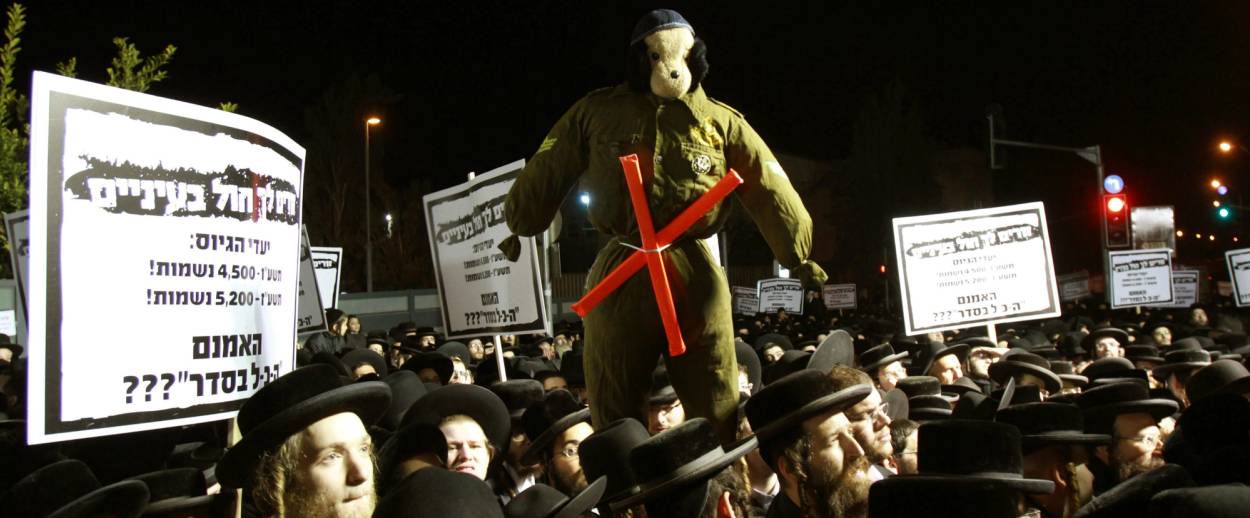Haredi IDF Soldiers Under Persecution
An ugly campaign shaming ultra-Orthodox soldiers recently came to a head for one family who reportedly faced death threats




When she answered the phone, Adi Glickman feared it was yet another prank call. Instead it was much worse.
“You should be ashamed of yourselves,” the anonymous male voice said into Glickman’s ear. “You’re a disgrace to Haredi Judaism. We’re disgusted by you.”
Glickman kept her cool. “Thank you,” she said. “Is there anything else?”
“You should watch out,” the voice replied. “We’re coming to kill your father.”
The caller had mistakenly thought he was speaking to one of Adi’s children. In fact, the call was directed at Adi Glickman’s husband, Yehuda, a commander in the Technology and Logistics unit of the IDF who has been the victim of a long-standing campaign of harassment. First came the phone calls in the middle of the night. Then Glickman’s number was falsely given out as a Passover charity helpline, which prompted 200 nuisance calls.
“Every dog has its day,” another anonymous caller told Adi. “You’ll pay in the heavenly courts. Or maybe even before then.”
Yehuda’s decision to serve in the Israeli Army has placed him on a direct collision course with many of his fellow members of Israel’s ultra-Orthodox community because their rabbinic and political leaders consider serving in the IDF strictly taboo. Haredi soldiers continually report a barrage of abuse against them, from verbal attacks by young children, to being spat on and even pelted with rocks.
“We’re talking about a three-year campaign against the ultra-Orthodox soldiers,” said Adi, referring to the emails, leaflets, and posters which have circulated in Bnei Brak, Jerusalem and other ultra-Orthodox neighborhoods where Haredi soldiers are accused of being Hardakim or Haredi l’Lo Da’at, meaning “Haredi without religion.” These messages are often communicated through cartoon illustrations that typically depict soldiers as pigs, or as idolatrous Torah-trampling ancient Greeks, under slogans such as “Crazies of the Neighborhood,” “Committing Suicide for a Wage Check,” or “The Hardakim are Annihilating Us!” (A counter-campaign has also been waged.)
The Hardakim campaign raises its ugly head… Again pic.twitter.com/eS2AaMMJYa
— Sam Sokol (@SamuelSokol) April 25, 2014
The issue of Army service ignites ferocious debate in Israel. Traditionally, the ultra-Orthodox, who do not recognize the state of Israel, were exempt from Army obligations. But as increasing numbers of eligible Haredi males remained in the Yeshivot, lawmakers have tried to create a Haredi draft bill that would force them to carry out their compulsory service, or risk prosecution and even imprisonment. The result is the contentious Equal Service law that finally came into force in 2014, sparking massive protests in Israel and even New York.
Two months ago, the Knesset approved an amendment, effectively scrapping the communal penalties imposed if annual quotas for ultra-Orthodox soldiers were not met. Netanyahu’s concession is a symbol of renewed Haredi power in the Israeli government. And it had the law’s original proponents fuming.
An estimated 25% of eligible ultra-Orthodox men serve in the Israeli army, and that number is slowly growing. The army is Israel’s biggest institution, its social melting pot. For many, joining the IDF is a way up the ladder, out of poverty. But those who do choose to put on the uniform find, like the Glickmans, that they have become outcasts within their community, pariahs of the Haredi world.
Sick of the harassment and frustrated by the lack of interest on the part of the police, the Glickmans made a choice in May 2015: They decided to conduct their own investigation in an effort to learn who was behind the campaign of harassment. Somebody had to be printing the nasty leaflets and poster. So the Glickman’s hired a private investigator who set up a sting operation by posing as a wealthy American donor happy to fund the next batch of leaflets.
The Glickman’s handed over all of their evidence to the Jerusalem police, who arrested three ultra-Orthodox male suspects on charges of incitement to violence a couple of weeks ago. Adi went on national TV to express her relief that the authorities were taking the problem seriously, at last. Unfortunately, by going public, Adi had made herself a target. That’s when the death threats started.
“We’re just a family trying to carry on our normal day-to-day life,” said Yehuda.
“Now it’s about my husband personally. It’s about [his] life,” Adi said. “The writing’s on the wall. And God forbid it may escalate into more serious violence. This can lead to murder.”
Previous: In Fight Over Military Service, Israeli Lawmakers Suggest Conscription For All
Israel Passes Ultra-Orthodox Draft Law
Ultra-Orthodox in NYC Protest Israeli Draft Law
Assaulting and IDF Soldier in Mea Shearim
Lisa Sanders is a writer and investigative documentary maker based in Israel.